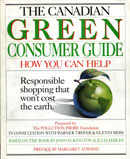
The Canadian Green Consumer Guide
How You Can Help
Publisher: McClelland & Stewart, Toronto, Canada
Year First Published: 1988
Year Published: 1989
Pages: 164pp ISBN: 0-7710-7162-0
Library of Congress Number: TX335.C35 1989 Dewey: 640.73'0971
Resource Type: Book
Cx Number: CX3723
A guide to responsible shopping that won't cost the earth.
Abstract:
Subtitled "How You Can Help", The Canadian Green Consumer Guide bills itself as a guide to "responsible shopping that won't cost the earth". Colourful, with lots of illustrations, (in fact, it's visually so "busy" that it's distracting to read) it provides helpful information for concerned consumers on a range of topics. Chapter headings include Food and Drink, Cleaners, Clothing and Toiletries, Gardening, and Travel and Leisure. There are helpful hints on low-impact camping, water-saving toilets, non-toxic cleaners, lawn care, ethical investing, and much else. There are short explanations of some major environmental problems, such as the greenhouse effect and the garbage crisis. Individual products and suppliers are frequently mentioned (especially Loblaws, whose products Pollution Probe is paid to endorse). Adapted by Pollution Probe from a European book by John Elkington and Julia Hailes, the Guide contains useful information for people who are trying to shop in an environmentally conscious way.
At the same time, the Guide is also deeply flawed, to the point where it may do as much harm as good. It touts the message that environmental problems are the fault of each of us as individuals, and that we can solve them by shopping more wisely. While no one would deny that it is important for us to be more aware and to make changes in our personal lifestyles, it is misleading in the extreme to suggest that this is where most of the problems, or most of the solutions, lie. For example, it's true that we should each try to make less use of private automobiles, but it's also true that if the government were to toughen vehicle emission standards, and if it were to make public transit more convenient and less expensive, it would have more effect than any amount of pleading with individual drivers to drive less. Similarly, it's all very well to urge us to try to avoid buying non-returnable pop bottles, but it would be a lot more effective if their manufacture was simply banned. Many environmental problems have a lot to do with bad policies and harmful structures, and need to be dealt with on the level of public policy. If we live downstream from a company dumping poison in the water (as millions of us do), we'd be a lot further ahead if we were able to get together and exert enough pressure to have those responsible jailed, and have the source cleaned up, than we would be each spending $235 to have our tap water tested, as the Canadian Green Consumer Guide suggests. By publishing a popular book that ignores the need for collective action and reduces environmental issues to individual consumer choices, Pollution Probe has made a contribution that is questionable at best.
[Abstract by Ulli Diemer]
Subject Headings


